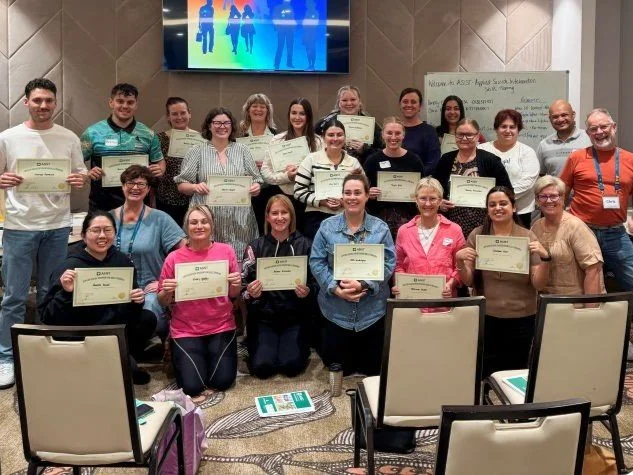Strengthening our communities with suicide prevention training
Applied Suicide Intervention Skills Training (ASIST) in Griffith
Earlier this year, Murrumbidgee Primary Health Network (MPHN) partnered with Well Aware Training to deliver six free suicide prevention workshops across the Murrumbidgee region. The sessions gave community members practical skills to recognise the signs of suicide, start important conversations, and connect people to support.
Griffith, Wagga Wagga and Deniliquin hosted the Applied Suicide Intervention Skills Training (ASIST) program, a two-day workshop building on previous safeTALK training delivered in 2024. Meanwhile, Hay, Gundagai and Finley welcomed their first safeTALK sessions, a half-day introduction to suicide prevention.
The ASIST course in Wagga Wagga
MPHN Suicide Prevention Lead Emma Bromham said she was delighted with the response.
“By delivering ASIST in Griffith, Wagga and Deniliquin, we were able to build on the knowledge people had gained the year before through safeTALK,” Ms Bromham said. “And by offering safeTALK in Hay, Gundagai and Finley, we helped those communities start their own journey in suicide prevention. In this way, we’ve been able to strengthen capacity right across the Murrumbidgee.”
Sometimes the best listener has four paws and a wagging tail. Here to support suicide-prevention training.
The training challenged some of the common myths around suicide and equipped people with skills to notice changes in others, ask the right questions, and support them to access help.
“It’s really important for people to understand that asking someone if they’re thinking about suicide will not put the thought in their head – that’s a myth,” Ms Bromham said.
“What we do know is that once people have done this training, they see the world a little differently. They’re more confident to ask, to listen, and to support someone who might be struggling. Many even encourage others to do the training, which means we’re steadily building a stronger safety net across our communities.”
MPHN has invested $50,000 into these workshops, recognising that suicide prevention is not just the responsibility of health services.
“Often, it’s family, friends, teammates or colleagues who notice the signs first,” Ms Bromham said. “By giving everyday people the skills to respond, we’re helping create safer, more connected communities.”
The signs that someone might be at risk aren’t always obvious. It may be changes in behaviour, withdrawal from activities, or increase in alcohol or other drug use. It might also be situational stress, like a relationship breakdown, financial difficulty, or a recent bereavement. Importantly, times of life change that society often views as positive, such as the birth of a baby, moving into retirement, or starting a new chapter, can sometimes feel overwhelming or isolating instead. Being mindful of these transition periods is just as important, because they too can increase risks.
This message resonates strongly in the lead-up to World Suicide Prevention Day on 10 September. This year’s theme, ‘Changing the Narrative on Suicide’, encourages communities to break down stigma, start conversations, and ensure that those who are struggling know they are not alone.
MPHN continues to offer free introductory suicide prevention training online. For more information, please visit mphn.org.au/suicide-prevention
If you or someone else is experiencing suicidal crisis, call Murrumbidgee Accessline on 1800 800 944, Lifeline on 13 11 14, or talk to someone you trust.



